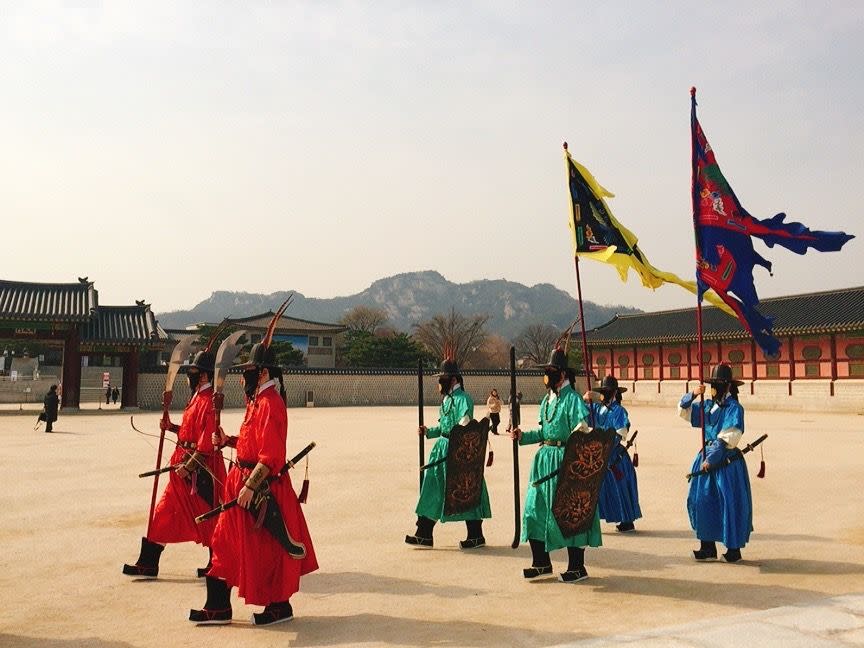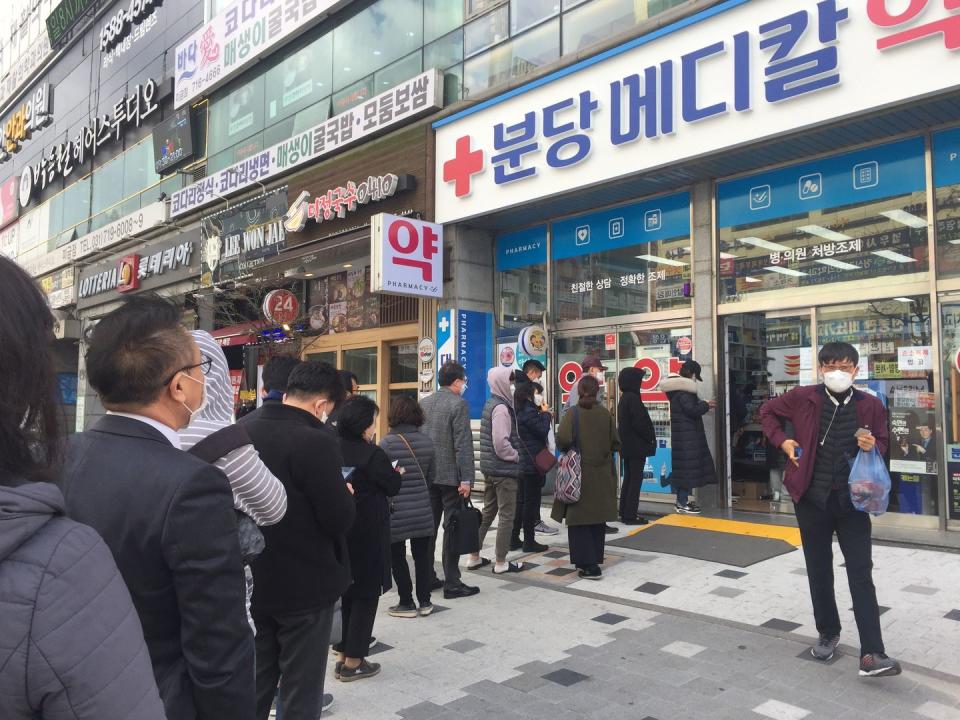I'm a 25-Year-Old Teacher Navigating COVID-19 in South Korea. Here's What Life Is Like for Me.

I’m an American that's been teaching in South Korea for one year now, and this week marks one month of living within the restrictions of the pandemic caused by the spread of COVID-19. While all citizens are on high alert, I’ll admit that it feels like life hasn’t changed drastically for us here in Korea.
Let me explain: Nationwide testing, transparent and frequent government updates, free healthcare for all affected and an overall sense of community responsibility has prevented me from feeling like my world has turned upside down. As of now, I feel like South Korea hasn't experienced the same lockdown that Italy has, or like some of the cities in the United States that I'm keeping an eye on, like New York, Los Angeles and my own family living in South Florida. Quick and aggressive preventative measures seem to have kept South Korea running, albeit at a slower, quieter pace.

I first heard of the virus at the end of January, during my Lunar New Year vacation in Taiwan. On my group tour of Taipei, there were whispers among fellow travelers about how serious the situation had gotten in China, and concern it would eventually spread. But like many others around the world, I wasn’t particularly worried at the time. By the time I returned to Korea a week later, everything had changed. Cluster infections were breaking out all over the country, face masks and hand sanitizer were quickly out of stock, and travel restrictions were put in place. The government released strict guidelines of preventative measures to control the spread, and for the most part, I saw others around me listening — and data suggested that the nation listened as well.
Two weeks later, it all felt like it was hitting closer to home — public schools were closed, and we were all advised to self-quarantine. I work in a Korean English academy, locally known as a hagwon, and my salary is based on students' tuition. While I knew it was a tough call for my bosses and colleagues, and many other private institutions, to close their doors, I was relieved I no longer had to teach a room full of worried children who couldn’t help but question their safety as they picked up on the situation around them.
Despite being in one of the first nations affected, I chose to stay.
It appears that much of the disease-spreading in Korea has been through churches. Due to the sheer volume of people in close proximity, it seems that religious gatherings create the perfect environment for what's now known as cluster spreading. Korea’s outbreak started in the city of Daegu when the virus spread among members of the Shincheonji religious sect, according to the Korea Herald. Patient 31, dubbed the “super-spreader,” reportedly resisted testing and then attended religious services and a wedding. Now, reports suggest that cases in Daegu account for more than half of Korea’s infections.
Even with the amount of cases in Korea ballooning at the time, I felt I would be safer here than anywhere else. The reality is that my job provides me with housing and national health care. If I were to return to America, I’d be unemployed and uninsured. How would I get by if I actually did contract the virus? I also didn’t want to risk bringing the virus back with me, especially since my mom is older and has health conditions that compromise her immune system. The choice seemed clear.
Some of my fellow teachers pulled what we call “midnight-runs” (leaving Korea unannounced) and fleeing to their home countries, out of fear of the virus compounded in part with the financial stress of possibly losing their jobs if schools remained closed. At first, I wondered if I should have done the same. But my faith in the South Korean government's ability to handle this pandemic has proven to hold true, because it feels like the situation is improving here with each passing day. The amount of new infections has significantly decreased, from thousands each week to fewer than a hundred per day.
People are scolded on the street if they're not taking precautions.
Everywhere I go, I see posters and commercials — translated into multiple languages — reminding people to wash their hands, cover their mouths, and call the national emergency hotline if they are experiencing symptoms. When you call the hotline, you can arrange transport to a testing facility to avoid public transportation. If you test positive for the virus, your treatment is free, regardless of your immigration status. These are just examples of the efficient and swift changes in the way this country operates that has made the situation feel less overwhelming.

Temperature scanners were placed in major shopping centers for anyone to use. There is hand sanitizer available in nearly every elevator and store entrance, and public transportation is regularly sanitized. A mask rationing system was created to make sure everyone has the chance to buy them. Navigation apps, like one that I use called KakaoMaps, even added a mask search feature, to help people find which stores have them in stock.
It’s rare to see people on the streets without protective face masks. Korean officials have advised us to wear masks in public, since many carriers of the virus may be asymptomatic, unsure if they are sick just yet. I’ve witnessed people scold strangers on the street if they are out without their faces covered. A business may even refuse entry if you’re not wearing one. This is what I mean by community action, and I feel that it works. Korea’s high survival rate is proof. According to the Korean CDC, even with over 9,000 confirmed cases, the death rate has remained relatively low. [Editor's note: Given the well-documented shortage of masks in the U.S., officials have asked Americans to refrain from purchasing these supplies, as they need to be mainly reserved for medical workers.]
I haven't met my new students yet, but they are the reason I stay calm.
I recently moved to a suburb outside of Seoul to start a new job after spending a year in another small city, but since schools are still closed, I’ve been keeping busy by decorating my new apartment and revamping my K-beauty skincare routine. I've only left my apartment for a mental break; every once in a while, I'll head out for groceries, or to take a walk. Because more than a month has passed since we all started practicing social distancing, I also occasionally meet up with friends — responsibly, though, which means we take great care to not expose each other to germs.
But my greatest sense of relief comes from people I don't actually know yet. Though we haven’t officially met, my new students send me their online assignments, plus memes aplenty, expressing their excitement to return to school. These children send me photos of their artwork, and tell me to stay healthy, reminding me that there are better days to come. It's something that I look forward to now, almost every day.
Moving to Korea was tough, but moving to Seoul somehow is even stranger, if that's possible. I spent my first weekend there exploring an eerily quiet city. Popular cafes were empty. There were no lines for the bus or train. Many people are still out and about, but limiting their excursions to work and running errands.
It's important to do what you can for your own neighborhood.
Life here is a little different now, but thanks to the majority of citizens following health guidelines, it hasn’t come to a halt. Major festivals and gatherings have been postponed, but many restaurants, entertainment venues and public spaces are still open. If it has been confirmed that an infected person has visited one of these places, we receive an alert and the business is promptly closed for sanitation. But it doesn't prompt us to recoil, so to speak.
We know to stay home, and I see my own community and neighbors sharing any extra resources they have with those in need. My new boss even gave me protective masks as a welcome present. While there is so much uncertainty in the world right now, social distancing is the one thing we know works for sure. It turns out that you can binge-watch your favorite shows while simultaneously working to save lives around you at the same time
It might sound cliché to some, but I've developed a daily mantra to remind myself how lucky I am to have resources that enable me to deal with this global crisis: "I am safe. I am healthy. This too shall pass." Whenever it gets too overwhelming, I just remind myself of that.
I understand why this situation can be so frightening for my loved ones back home. As someone who has spent more time dealing with the impact of COVID-19 than most Americans, I’m here to say that it can and will get better, as long as everyone works together and follows the rules. I know some people may feel like government officials aren’t doing enough to keep our family or friends safe, but if this health crisis has taught me anything, it's that what we choose to do as a community matters just as much — and how we respond independently in our own homes and in our own lives can make all the difference in the world.
You Might Also Like

